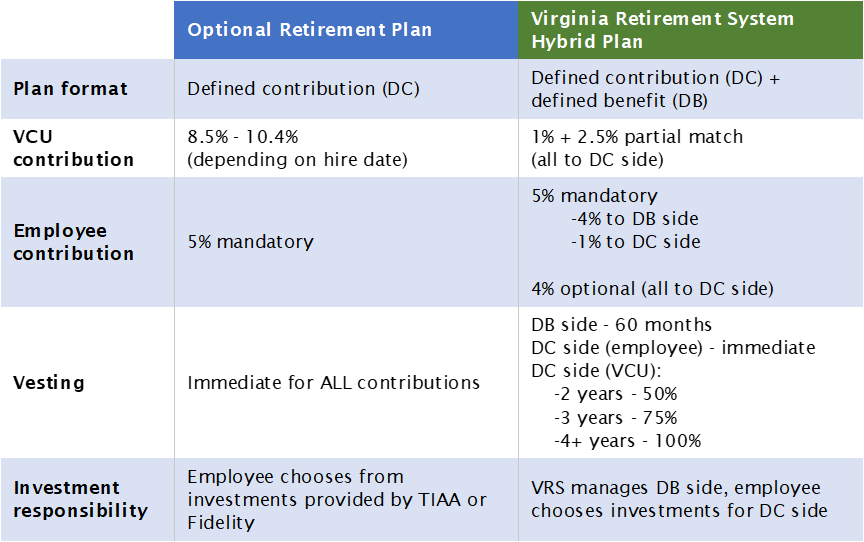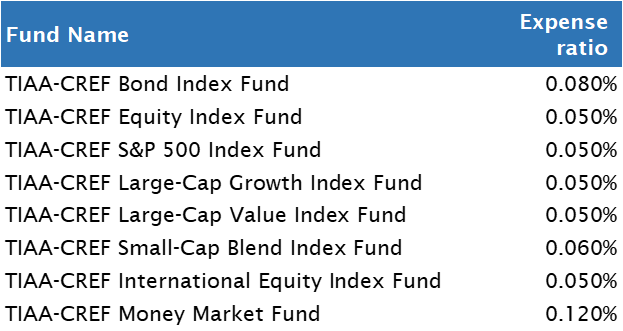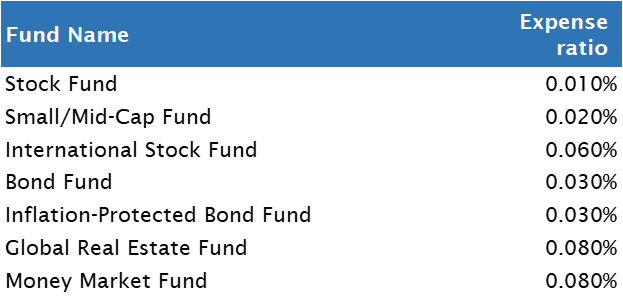If you work for Virginia Commonwealth University in Richmond, Virginia, then you have some pretty great retirement benefits. Unlike employees at most private companies, VCU employees have access to more than one retirement plan.
For the first plan (referred to as the “Core Retirement” plan by VCU), employees must choose between two options: the Optional Retirement Plan (ORP) or the Virginia Retirement System (VRS) Hybrid Plan.
Here is a basic side-by-side comparison of the plans:

VCU employees also have access to a second set of plans including: the VRS 457 Deferred Compensation Plan and a 403(b) plan. For highly compensated employees, the combination of these plans offer tremendous opportunities to save for retirement.
If you recently started working at VCU and need to make a decision between the ORP and VRS Hybrid plan, you’ll want to start by answering the following questions:
- Do the different contribution levels matter?
- Will I work at VCU long enough to become 100% vested in the VRS plan?
- How much investment risk am I willing to take on?
- Which plan offers the best investment options?
At the most basic level, both the contribution levels and vesting schedule favor the ORP. VCU makes a larger contribution to the ORP and all funds vest immediately.
However, if you want access to a pension benefit (i.e. a monthly “paycheck” in retirement), then the VRS Hybrid plan might better suit your needs. What about the investment options?
Investment Options
If you decide to go with the ORP, you must select one of two vendors to provide custody for your funds: TIAA or Fidelity. Unfortunately, I’m not excited about the investment options available at either custodian. Both TIAA and Fidelity offer their respective in-house target date funds, which I believe are inferior to other options available in the marketplace. More concerning, both vendors offer meager choices for passive index investments.
TIAA
TIAA offers the following choices for low-cost passive investment funds within the ORP:

This strikes me as somewhat disappointing to see on behalf of VCU’s employees. If you invest through TIAA and you want to diversify into value stocks or real estate, you’re forced to select from higher cost funds in the plan, even in the face of significant research that demonstrates that high-cost investments usually underperform low-cost investments over time. It’s still possible to develop a decent portfolio, but I don’t believe it’s optimal.
It also is worth noting that two of the passive investment options (Total Bond Market and Total International Stock) don’t show up under the list of “Passively Managed Investments” on TIAA’s website. Instead they are hidden under “Target Date Funds”, which doesn’t make much sense and could lead to confusion. TIAA should make every effort to make the investment lineup as clear and transparent as possible.
What’s up with the money market funds?
TIAA also offers two competing money market funds, which is weird. The reality is that money market funds are fairly interchangeable, so the prime differentiator is cost. So why does TIAA offer both the Vanguard Federal Money Market Fund and the CREF Money Market Account? The Vanguard option is cheaper (0.11% vs 0.24%). And Vanguard is widely regarded in the financial industry as running some of the best money market funds. This leaves me at a loss to explain why TIAA doesn’t just drop their in-house money-market option and offer the Vanguard option alone.
And the different options in other plans?
One last point of contention here is that TIAA offers a different set of passive investment options within VCU’s Tax-Deferred Annuity 403(b) plan. These include:

What is driving the difference in investment choices between plans? If one set of investment options is acceptable for the 403(b) plan, why are they not available in the ORP plan (or vice versa)? I would argue that the investment options should be uniform across all of VCU’s retirement plans. This would reduce the burden of finding the right investment funds for participants and plan administrators. There is also a cost to complexity, and it appears VCU’s employees could benefit from a more straightforward approach.
Fidelity
What about Fidelity? They offer the following index fund options:

With these funds, you at least have a fighting chance of constructing a high-quality investment portfolio, with appropriate asset allocation and global diversification. However, the main focus of the investment menu still seems to be on providing participants with higher-cost, active investment options (of which there are 11 choices).
VRS Hybrid
The VRS Hybrid investment options seem much better:

Given this menu of choices, most passive investors can create something suitable to their financial and investment goals.
If I had to choose a plan based solely on the investment choices, I would lean toward the VRS Hybrid plan.
Make it better
VCU offers some great retirement benefits, but there is room for improvement. If you participate in one of the plans administered by TIAA or Fidelity, consider contacting your HR team to lobby for better and more streamlined investment choices. If enough employees advocate for improved investment options, then it’s likely VCU would take some action and work with TIAA and Fidelity to improve the investment choices.
The costs may seem small on an individual level. But within the ORP alone, Fidelity and TIAA manage close to $1 billion for VCU employees. So costs can add up quickly when aggregated across VCU’s employee base.

